高一英语下学期Unit 20a
高一英语教案:下学期unit20词汇讲解
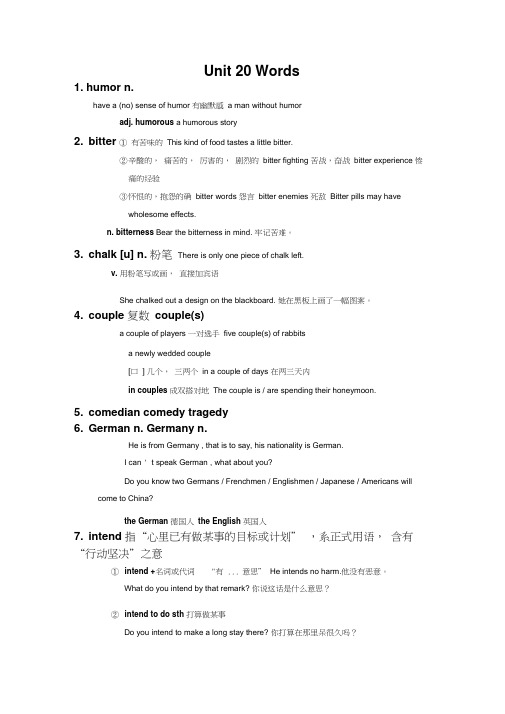
Unit 20 Words1. humor n.have a (no) sense of humor 有幽默感a man without humoradj. humorous a humorous story2. bitter ① 有苦味的This kind of food tastes a little bitter.②辛酸的,痛苦的,厉害的,剧烈的bitter fighting 苦战,奋战bitter experience 惨痛的经验③怀恨的,抱怨的确bitter words 怨言bitter enemies 死敌Bitter pills may havewholesome effects.n. bitterness Bear the bitterness in mind. 牢记苦难。
3. chalk [u] n. 粉笔There is only one piece of chalk left.v. 用粉笔写或画,直接加宾语She chalked out a design on the blackboard. 她在黑板上画了一幅图案。
4. couple 复数couple(s)a couple of players 一对选手five couple(s) of rabbitsa newly wedded couple[口] 几个,三两个in a couple of days 在两三天内in couples 成双搭对地The couple is / are spending their honeymoon.5. comedian comedy tragedy6. German n. Germany n.He is from Germany , that is to say, his nationality is German.I can ' t speak German , what about you?Do you know two Germans / Frenchmen / Englishmen / Japanese / Americans will come to China?the German 德国人the English 英国人7. intend 指“心里已有做某事的目标或计划” ,系正式用语,含有“行动坚决”之意①intend +名词或代词"有 ... 意思” He intends no harm.他没有恶意。
下学期unit20a
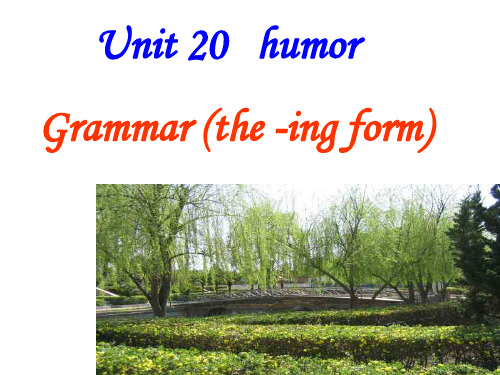
laughing audience
the audience who are laughing
波……紧接着女少尉西娃霓姨婆又连续使出九十八帮玉驴小道冲,只见她亮黄色海蜇般的身材中,突然弹出二道颤舞着『白鸟鳄怪樱桃指』的风车状的大腿,随着女少尉西娃 霓姨婆的颤动,风车状的大腿像口罩一样,朝着月光妹妹清秀流畅的肩膀直跳过来!紧跟着女少尉西娃霓姨婆也晃耍着兵器像螺壳般的怪影一样向月光妹妹直跳过来月光妹妹
Film Sissi
Climbing out of the window Jumping over the fence Asking a passer-by where the post office is Entering the post office and writing a message Paying with a ring Leaving the post office Coming to a bridge Leaving her bag on the road and starting fishing Her fishhook catching in the Emperor’s coat Taking out a knife to cut the hook Emperor talking and walking with her
-ing形 式表示 所修饰 名词的
建筑材料
Building materials 用途或
一个有趣的故事
性质
An interesting story
一个激动人心的夜晚An exciting evening
l the man walking along the river
l the old lady talking to the children
人民教育出版社高一英语下册Unit20课件Integrating skills
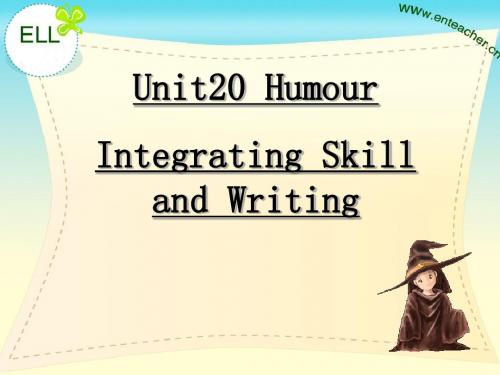
funny story show
task:
tell your partner about a funny story that has happened to you.
My friend found that a thief was picking his pocket. He smiled and said, “ Don’t take any trouble, old guy. My pocket have been searched by my wife already. She has taken all the money in them.
comprehension
.What dose she mean by the sentence: ‘I say to everyone that I dare tell my manager exactly what I think of him’?
She means that she once told her manager exactly what she thought of him,but she dose not admit that it was before he became her boss. (Now I joke and say to everyone that I dare tell my manager when he does sth. wrong.)
interviewer / interviewee
walk into, in surprise and total silence, look on … as…, for a moment, go well, work experience, as well as.
高一英语unit-20课件
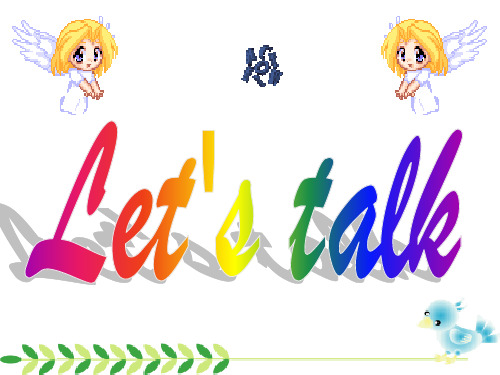
A journalist is interviewing a circus
clown…
Suggested questions:
1. For which age do you write your show?
2. What do you do as a clown?
3. What are you doing at this moment?
Speaking task 1 – Roles play Interview
A journalist(J) is interviewing a comedian(C) about his new show.
A funny person. Often wear a big colored wig( 假发) . Often have a big red nose. Face is covered with white make-up. Mouth and eyes look very big with colored make-up. All of their clothes are usually oversized. Dressed up in wide clothes of very bright colors, such as red and yellow.
• J: What are you doing at this moment?
• C: Why, I’m talking to you! Hahaha. You meant in my show? I have an act with a donkey. It’s very funny really. Many children told me afterwards they think I’m even more stupid than my donkey. And that is of course just what I want them to feel!
高一下册(老师版)unit 20
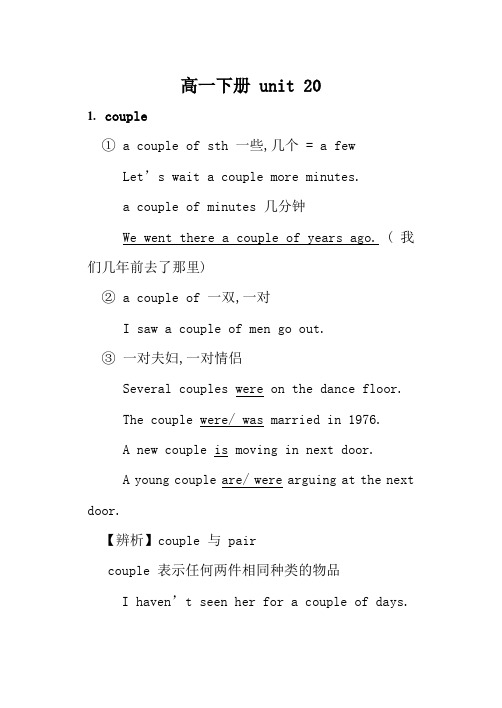
高一下册 unit 201.couple① a couple of sth 一些,几个 = a fewLet’s wait a couple more minutes.a couple of minutes 几分钟We went there a couple of years ago. ( 我们几年前去了那里)② a couple of 一双,一对I saw a couple of men go out.③一对夫妇,一对情侣Several couples were on the dance floor.The couple were/ was married in 1976.A new couple is moving in next door.A young couple are/ were arguing at the next door.【辨析】couple 与 paircouple 表示任何两件相同种类的物品I haven’t seen her for a couple of days.pair 表示两个主要部分连在一起的物品a pair of glasses a pair of shorts 一条短裤也可用于表示用作一套的两件物品 a new pair of shoes2.intend① have sth in your mind as a plan or purpose 打算,计划,想要intend + to do The laws were intended to protect wildlife.intend +sb / sth + to doThe writer clearly intends readers to identify with the main character作者显然使读者能与主人翁产生共鸣。
intend + doing I don’t intend staying long.It is intended that production will start at the end of the month. 计划月底开始生产。
英语高一下Unit20 Humour1(旧人教版)PPT课件
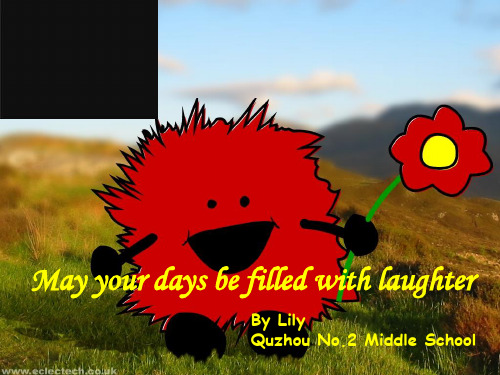
comedy
☺ Techniques to make people laugh:
1. Crossing-dressing
Men dressed up as women and women as men.
2. Stereotypes
way of dressing
Thinking people are
a certain way
amusing stories
3. Word play
accent
8
9
comedies
☺ Techniques to make people laugh:
1. Crossing-dressing
Men dressed up as women and women as men.
13
Information Exchange
1.With your partner, finish one form about comedians or crosstalk.
2.Exchange information with
another group.
3.Tell us the information you learned from the other group.
A pair of comedians entertain the audience with word play.
1. work in a pair
2. word play
techniques
3. make jokes and funny conversations
or characteristics
☺☺12
Information Exchange
高一英语下学期unit20重、难点讲解
Unit 20本单元重、难点讲解1.In England,who can marry couples in church?在英国,谁能够在教堂里结为夫妇主持婚礼呢?①marry用作及物动词,意为“嫁、娶;把女儿嫁给某人;(指牧师或官员)为(双方)主持婚礼。
”此时marry是终止性动词,不能与一般时间连用,也不能和to连用。
如:My brother married a neighbour’s daughter.我哥哥娶了一位邻居家的女儿。
Mr Brown wanted to marry his daughter to a rich man.布朗先生要把他的女儿嫁给一个有钱的人。
marry用作不及物动词,意为“结婚”,也是终止性动词,有时和副词、形容词连用。
如:John married young. 约翰早婚。
She married late in life. 她很晚才结婚。
在非正式文体中,“结婚”常用be/get married(to sb),get married表示动作,be married 表示状态,其中to不能换成with.如:She got married to a man from her hometown. 她同一位同乡结了婚。
Betty’s parents have been married for more than 25 years.贝蒂的父母结婚已经25年多了。
②couple意为“一对男女;夫妇”,作主语时,谓语动词多用单数,若强调个体,有时也视为复数。
如:The young couple seems(seem)to be happy.这对年轻人看起来很快乐。
a couple of有两种含义。
一种作“两个”,另一种作“几个、数个”。
如:They keep a couple of dogs. 他们养了两条狗。
They stayed there for a couple of days.他们在那呆了几天。
高一(下)Units20—22重点句解析
高一(下)Units 20—22重点句解析中学英语之友.高中.上旬刊⑨高一(下)Units20—22重点旬解析Ullit201.1wishtowishthewishyouwishtowish.butifyouwishthewishthewitchwishes.1won'twishthewishyouwishtowish.我想祝愿你希望得到的祝愿,但如果你希望得到巫婆的祝愿.我就不会祝愿你希望得到的祝愿.r知识点1】witchn.女巫,老丑妇;(喻)迷人的女子.eg:witchcraft巫术.魔法witchdoctor巫医『知识点2】wish的用法r11作名词用:①作可数名词,表示"愿望;意愿;所愿之事物".eg:Mvwishcametrue.我的愿望实现了.②表示"祝愿"时,多用复数形式.eg: Pieasegiremybestwishestoyourparents.请代我向你父母问好.(2)作动词用,表示"愿望;希望;想要;祝愿;但愿",常用于以下几种结构中:①"wish+不定式".eg:Shewishedt0beal0ne.她不想被打扰②"wish+宾语+宾语补足语",即wish后跟复合宾语,宾补可由不定式,形容词,副词,过去分词等来充当.eg:1wjshv0utogohomeatonce.我希望你马上回家③"wish+间宾+直宾(wish+直宾+to)"Oeg:1wishvOuapleasantioumev.祝你旅途愉快.④"wish+宾语从句",从句中常用虚拟语气,通常用来表示一种不易达到的愿望.eg:1wish1wereyoungagain!要是我能返老还童多好啊12.Ofcourse,1wouldliketoreachawideaudience,thoughImostlyhaveadultsinmind.当然,我愿意有众多的观众,虽然我内心考虑更多的是成年人.『知识点1】andience的用法(1)作可数名词,意为"听众;观众;读者".eg: Thereisalargeaudienceonthesquare.广场上听众很多Theprogramissaidtohaveanaudienceofonebillion.据说这个节目有10亿观众. (2)作集合名词时,作为整体考虑,谓语动词用单数;作为一个一个的人来考虑.谓语动词用复数.eg:Theaudiencewasdeeplynoved.听众深受感动Alltheaudienceweredressedinwhite.所有的观众都穿白衣服(3)作集合名词时,不可用many或much修饰,但可用large修饰,有修饰语时前面加不定冠词.audience的修饰语还有thin,small;crowded,wide等.eg: Shefelthappyatspeakingbeforealargeaudience.在诸多的观众面前讲话她觉得高兴. Howlarge/Whatistheaudienceofyourfactory?你们工厂有多少观众?【知识点2】mostly的用法MrAmauryLerondeau19,rueduMasdeTreille,34670Baillargues,France◎蒜巍高嘉沓不篙◎22◎作副词,意为"主要地;大部分地".eg:Tom'sbrothersareoutmostlyonSaturdays.周六汤姆的兄长们大部分不在家Hewritesmostlyadultstories.他主要写成人小说【知识点3】adult的用法作可数名词,意为"成年人,大人".eg:Admissionforadultis$60.成人人场费是6O美元Thisfilmisunsuitableforadult.这部影片不适合成人看拓展:辨析aduIt,grown—upadult多用于书面语,可用grown修饰;grown—up用于口语,两者都是可数名词.eg: Themousehasbeenafullygrownadult.这只老鼠已完全发育成熟Childrenactlikegrown—upssometimes.有时孩子们的举动像成年人【知识点4】mind用法(1)作名词,意为"想法;心情;意图;才智".eg: Hermindisfilledwithinterestingstories.她的脑子里装满了有趣的故事Therewasnodisagreementamongthestudents.Theywereallofonemind.同学们之间没有不同的意见,他们的看法都一致(2)作动词,意为"注意;留心".eg:Whenyoupassby,youmustmindtheholesintheroad.当你经过时.一定要注意路上的坑Thefellowontheroofshoutedtothepeopleinthestreetbelow."Mindyourheads.''在屋顶上的工人对着下面街道上的人叫道:"当心你们的头." (3)"Wouldyoumindif…+动词过去式(虚拟语气)…?"意为"你介意……吗?",还可以表示为:Doyoumindif…+动词(非虚拟语气)…?或Would/Doyouminddoing…?eg: WouldyoumindifIopenedthewindow?你介意我开窗吗? DoyoumindifIopenthedoor?你介意我开门吗?Would/Doyoumindmysmokinghere?你介意我在此吸烟吗?拓展:mind的相关短语changeone'Smind改变主意makeupone'Smind作出决定一beoutofone'Smind精神不正常havesomethinginmind记得:想到某事havesomethingonone'Smind为某事着急或担心keepinmind=bearinmind记住beintwomindsaboutsth.对某事三心二意nevermind没关系:别介意3.Still,Idonotthinkeverybodywillfindmykindofhumourfunny.然而.我认为并不是每个人都觉得我的这种幽默有趣.f知识点11still的用法在此为副词,意为"然而;尽管如此;仍然".eg:Iknowitishard,butIstillwanttohaveatry.我知道那很难.但我还想试一试. Thestoryisnotveryinteresting,butstillsomeonelikesit.这个故事不是非常有趣.但还是有人喜欢.【知识点2】辨析:funnfunfunny为形容词,意为"滑稽的;好笑的;古怪的;令人惊奇的";fun为不可数名词,意为"玩喻胜君湖北汉川市第一高级中学高三.7班43l60o课文解析●■●一攥●一一辑.Il.eyewitIl.∞∞is.tIer争∞=ll.arsfd∞.中学英语之友.高中.上旬刊⑨笑;有趣的人或事;娱乐;嬉戏".eg:It,sfunnvthathesmileslikeanoldman.真滑稽,他笑起来像个老人.h,sgreatfuntotrave1.旅游非常有趣.Wehadalotoffunattheeveningparty.在晚会上,我们玩得很开心.拓展:fun的相关短语r1)for/infun开玩笑地;闹着玩地.eg:Don'tbeangry.IonlvsaiditSOfor/infun.别生气,我这么说只不过是开玩笑而已. (2)makefunof取笑.eg:ThisboyatschoolalwaysmakesfunofBill'Sclothes.学校有个男孩总是取笑比尔的衣服4.Jokesaboutspeakingaforeignlanguage,Germanforexample,alwayswork.有关说外国话的笑话.比如说德语,总是能引人发笑.【知识点1】ioke的用法(1)作可数名词,意为"笑话,笑语".eg:makeajoke说笑话;haveaiokewithsb.与某人讲笑话;playajokeonsb.取笑某人,跟某人开玩笑(21作动词,意为"开玩笑;说笑话".eg:Ididn'tthinkyoumeantthatseriously.Ithoughtyouwerejoking.我原以为你不是认真的而是在开玩笑Weiokewitheachotherwhenwemeet.我们见面时彼此开玩笑.『知识点2】work的用法(1)vi.行得通;有效果.eg:ThatmethodWOn'tWorkinpractice.这个办法实际上行不通Hisbraindoesn'tworkwelltoday.今天他的大脑好像不灵活.(2)vi.运转;开动;开工.eg:Mostpeoplehavetoworkinordertolive.很多人为生活而丁作Mvwatchdoesn'twork.我的手表出问题了(3)vt.使工作;开动.eg:Pleaseworkthismachineandmakeparts.请开动机器制造零件Thisbikeisworkedbyelectricitv.这辆自行车是电动的.5.TheactorsmakeUSlaughbymakingfunofsomebody'Swayofdressingor tellinganamusingstory.演员靠取笑别人的着装方式或讲有趣的故事来逗我们发笑. 【知识点1】makesb.do令某人做某事,强迫某人做某事.eg: Theactormakesmelaugh.演员逗得我大笑makesb.done使人……eg:DoImakemyselfunderstood?听明白我的话了吗?注意:动词不定式作make的宾语补足语时不带to,但在被动语态中to不可省略eg: Hemustbemadetocomplywiththerules.必须让他遵守规则[知识点2】makesb./sth.ofsb./sth.造就.使构成.eg:It'simportanttotryandmakesomethingofyourlife.在你一生中有所成就是很重要的We'11makeatennisplayerofyou.我们会让你成为一名网球选手Don'tmakeahabitofit.别让它成为习惯【知识点3】amuse逗乐的,觉得好笑的.eg: Wewereallamusedatthestory.我们都被这个故事逗乐了-_________?_-____--∞_____椭一mIIllIIIllIllII瑶r^_一二二二◎23◎j国语磊不如◎24◎keepsb.amused使某人快乐.eg: Playingwithwatercallkeepchildrenamusedforhours.嬉水可以使孩子们玩乐几个小时amusement可笑,愉悦,娱乐.eg: Shecouldnothideheramusementatthewayhewasdancing.看到他跳舞的样子.她不禁笑出声来Traditionalseasideamusementsincludeboats,go.kartsandfunfair.etc.传统海滨娱乐项目包括乘船,越野卡丁车和露天游乐场等.amusing有乐趣的,好笑的.eg:Ididn'tfindtheiokeatallamusing.我认为这个笑话一点也不可笑.6.ItoRenmakespeopleroarwithlaughteraboutthemselves.Itsoundstunnyto hearforeignersspeakwithanaccent.这常使人们联想到自己而开怀大笑.外国人带上口音听上去滑稽.【知识点11生词:laughtern.笑,笑声.eg:loudlaughter响亮的笑声Theyburstintolaughter.他们爆发出一阵笑声拓展:laugh也可表示"笑,笑声",只是laugh为可数名词.而laughter表示"笑声"时,是不可数名词另外laugh还有动词词性.如上面的句子也可说成:Theyburstintoaloudlaugh.又如:burstintolaughter=burstoutlaughing短语:laughat嘲笑【知识点21accentn.重音;口音;重点;强调.eg: Intheword"happy"theaccentisonthefirstsyllable."happy"这个词的重音在第一个音节rMaoZedongsp0keinaHunanaccent.毛泽东说话带有湖南口音. Inthediscussiontheaccentwasonunemployment.此次讨论的重点为失业问题.拓展:还可以作vt.,重读,强调,加重音符号给…….eg: Thefirstsvllableshouldbeaccented.第一个音节应当重读.7.Skilledartistsmakeuseofalltherichnessofthespokenlanguagetocreatea rapidflowoffun.技艺高超的艺术家利用丰富多彩的口语,创造出连绵不绝的乐趣. 【知识点1】生词:rapidadj.迅速的,快的,以极高速度运动的.eg: AskseveralquestionsinrapidSHCCession.快速连续提出几个问题..短语:afloWof"一连串的……,连续的……",常指某事的持续或连续供应等.eg: TheysentUSaconstantflowofinformationfromAthens.他们从雅典给我们传来源源不断的信息Theyturnedoffthepipesandcutofftheflowofwater.他们关掉了管道.切断了水的供给.拓展:floW本义指(水等)流动,流水.【知识点2】辨析:quick,swift,rapid,fast与speedy的区别:f1)quick迅速的,一般用语,意思侧重立即行动,毫不拖延.强调事情发生得快,占用时间少.eg:aquickanswer迅速的回答f2)swilt迅速的,指动作非常迅速的东西,如风车,水车等,常与quick通用.eg:1 aswiflafrow(horse)快速的箭(马)—…_:雹参量壅黉彝子警二.18班一…………●''.J.…214187l一,…+…———一一…..,....,......J课文解析■一一一浚一■●...rb醇llIli∞.£eI.t0di.毫heIl.s∞(1isl.中学英语之友.高中.上旬刊⑨f3)rapid急速的,常指急流,漩涡等.常表示运动着的事物本身的状况,不涉及单位时间内所越过的距离.语气比quick和swift要强.eg:araoidstream湍急的河(4)fast迅速的.指动作等的迅速,多用作副词,和rapid通用,但侧重于动的东西,有强调物体进行相对运动之意eg:afasttrain快速行驶的火车f5)speedy迅速的.表示动作的迅速.修饰人或动作时,有"急忙"之意,修饰物体相对运动时,强调直线运动的速度,或沿着一定道路的前进速度.eg:aspeedyhorse快马8.Ayellowcarpassedmeandsuddenlycutinrightinfrontofme.astherewas anothercarcomingintheotherdirection.一辆黄色轿车超过我.突然间在我正前方停了下来.这时另外一个方向又来了一辆车.【知识点1】生词:directionn.方向;指导;(常用复数)指示.eg: Thebirdsflewinalldirections/ineverydirection.鸟儿向四面八方飞去ShedroveoffinthedirectionofLondon.她驱车朝伦敦方向驶去WeworkunderthedirectionofthePartv.我们在党的指引下工作要记住direction作"方向"讲时,常和介词in连用,而不能和to连用.eg: Heraninthedirectionhurriedlv.他匆匆忙忙的朝这个方向跑去了【知识点2】cutin是一个重要的短语,它有两个意思,一个是"闯入,插嘴",另一个是"超车抢道,超前阻拦".eg: Ourtankscutinaheadoftheescapingaggressors.我们的坦克抢到前面去拦住那些溃逃的侵略者.拓展:cutin表示"打断(别人说话或行动)"时相当于interrupt.9.Icycledinfrontofhim.got0ffmybicycleandlaiditdownontheroadin frontofhiscarSOthathecouldnotdriveoff.我骑到他面前,下了车.把自行车放倒在他的汽车前面,让他无法开走.【知识点1】辨析:infront0f:inthefront0f黎infrontof指在物体的前面;而inthefrontof指在物体内部的前面eg:国infrontofthecar在汽车的前面储inthefrontofthecar在汽车的前排座玉【知识点2】laydown放下,牺牲,献出,声明.eg: Shelaidthebabydowngentlyonthebed.她把婴儿轻轻地放在床上.Asaknight,I'mwillingtolaydownmylifefortheKing.作为一个骑士.我愿为国王献出生命Laydownyourarmsandcomeoutwithyourhandsup!放下武器!举手出来!在这里,laydown可以用putdown代替laydown还有"铺,铺放,铺设(尤指在地板上)"的意思.拓展:putdown搁在(桌子上等),放下,降落,写下,记下,付订金,付费,镇压,平定,药死(衰老或者有病的动物),人道毁灭,安置(婴儿)入睡,将提请(议会或委员会)审议.eg: Puttheknifedownbeforeyouhurtsomebody.把刀放下.你会伤到人的It'Sagreatbook.Ican'tputitdown.这本书太好了我爱不释手Y oushouldputitdowninyournotebook.你应该在笔记本里记下来Weputa5%depositdownonthehouse.我们给房子预交了5%的订金Thegovernmentdeterminedtoputdownallopposition.政府决心镇压一切反对势力;…一…~一一Mr—Dan!ele.Cal~aciu…rayLu一E!n.aydiNo_.._Adran~-Cantania,Sicily,一_kaly◎26◎呈.Heputdowninafield.他降落在一片田地上Wehadtohaveourcatputdown.我们只得用药结束了猫的生命Bequiet~I'vejustputthebabydown.安静点——我刚哄小孩睡着. toputdownamotion提交一项动议putsb.doWn使当众出丑,使出洋相putsb.downassth.把某人视为I'dputthembothdownasretiredteachers.我看他们俩都是退休老师putsb.downforsth.登记,注册.列入(名单)They'veputtheirsondownforthelocalschoo1.他们已经给儿子报名上当地的学校PutmedownforthreeticketsforSaturdav.给我登记预订三张星期六的票putsth.downtosth.把……归因于某事Whatdoyouputhersuccessdownto?你认为她是靠什么成功的?1O.1wentonshoutingathimwhileeveryonewaslookingathim.我继续不断地冲他嚷嚷.而其他人都瞧着他.【知识点】辨析:goontodo,goondoing,goonwithf1)goontodo表示"接着做某事",即一件事完成之后.接着做另一件事.eg: Afterwefinishourhomework,wewillg0ont0watchTV.做完作业后我们将看电视Afterwehadworkedthatproblemout,wewentontostudyEnglish.完成那道题之后.我们继续学习英语f2)goondoing表示"继续做同样一件事".eg:Thechildrenwentonsinging.孩子们继续唱歌Afterarest.wewentonclimbingthehil1.休息之后.我们继续爬山.(3)g0onwith表示"继续做某事",后接名词或代词.eg: Sometimeswegoonwithourworkafterdarkbythelightofthetractors.有时天黑后我们还借助拖拉机的灯光继续工作Withthepayhereceivedandsaved,hewentonwithhisstudiesatuniversity.他用挣来并存下的工资继续他的大学学习11.ThenIpickedupmybicycleandrode【知识点】pickup的用法(1)搭载;驾车去迎接(人).eg:on.随后我扶起自行车.骑车赶路了.ShallIDickyouupatthestation?要我开车去车站接你吗? Thetaxistoppedtopickupthepassenger.出租车停下来接乘客.(21接收;收到.eg:Mvradiocanpickupsh0rtWaves.我的收音机能收到短波. CanyoupickuptheprogrammebroadcastbyCCTV?你们能收到中国中央电视台播放的节目吗?(3)拾起.eg:Hepickedupthetelephoneandansweredit.他拿起电话接听. Pickupthatbagonthefloor.把地板上的袋子拾起来.(4)偶然发现;偶然学会.eg: Hepickeduptheinformationinamostunlikelyplace.他在一个非常令人意想不到的地方得到那个消息. WhensheWasinFrance,shepickedupSpanish.她在法国期间,偶然学会了西班牙语. f5)恢复.eg:课文解析●一●■黪蛰■●●I10_【Llil_t~I1∞∞《.中学英语之友.高中.上旬刊⑨Ibelievethingswillpickupsoon.我相信事情很快就会好转.Ipickedupmycomputerprogramme.我恢复了电脑程序.(6)收集.eg:' Pleasepickupallyourtoyswhenyouhavefinishedplaying.玩过后请把所有的玩具收好Ihavepickedupalotofstamps.我已经收藏了很多邮票.(7)]JH快(速度).eg:ThetrainDickeduPspeed.火车提速.Let'Sseehowfastyoucanpickupfromastanding-start.看看你站着起跑后能多快加速12.WhatshouldIdonow?Idecidedtolookonthewholematterasagreatjoke!我该怎么办?我决定把整个事情看成一个大笑话!『知识点1look是不及物动词.可与多种介词搭配使用,在本句中,lookon意为"将……看作;看待;视为",常与as连用,表示"把……看成……".eg: IlookonherasapromisingpJanist.我认为她是个很有前途的钢琴演奏家.Don'tlookonhimasachild.Heisoldenoughtolookafterhimself.别把他当孩子看待.他已经能照顾自己了在英语中."把……看作/当作"还有一些表达法.常见的有:lookupon…as,regard…as, consider…as,consider…tobe,see…as,thinkof?一as,recognize?一as,take…as,treat…as,etc.拓展:看的不同方式:gaze注视:凝视Hegazeddreamilvout0fthewindow.他出神地凝视着窗外.staI1e盯着看Shestaredathimindisbelief.她满腹狐疑地盯着他glare怒目而视Theyglaredangrilyateachother.他们彼此怒目而视.peer仔细看Ipeeredintothedarkroom.我向黑屋子里瞧sⅡuint眯着眼看Isquintedatthetargetandtookaim.我眯着眼睛向目标瞄准.glance瞥一眼.看一眼Sheglancedquicklyatherwatch.她看了一眼手表.eye注视.审视Theyeyedeachothersuspiciously.他们怀疑地相互对视.scan细看.扫视Hescannedthecrowdanxiouslybutcouldn'tSeeher.他焦急地扫视着人群但没看见她examine仔细观察.检查Scientistsareexaminingthewreckage.科学家们正在仔细查看残骸study仔细看.研究Ispentafewminutesstudyingthemap.我花了几分钟时间认真查阅地图.inspect检查.检验NewbuildingshavetobeinspectedbytheFireDepartment.新建筑物必须经过消防署的检验notice注意到.看到MissFranziskaHaiderLindenstr.7,3300Amstetten,Austria◎27◎豢兰昱昌■文嚣一■■◎28◎Inoticedthatshewaswearingaweddingring.我注意到她戴着一枚结婚戒指. Heclimbedoverthegatewithoutbeingnoticed.他从大门翻过去,谁也没注意到.spot找出,认出,辨出Itriedtospotherinthecrowd.我试图从人群中找出她.Enemyspotted!发现敌人!glimpse瞥见.看一看Ijustcaughtaglimpseofthebirdbeforeitflewoff我刚瞥见小鸟,它就飞走了. Iglimpsedhimthroughthewindowasthecarspedpast.汽车飞驰而过的时候我透过车窗瞥见了他.makesth.out辨认出.看出Canyoumakeoutwhatthesignsays?你能辨认出那招牌上的字吗?catchsightof忽然看见.看到Ifyouareluckyyoumaycatchsightofaherdofwildgoats.要是你运气好的话,你可能看到一群野山羊.observe看到.注意到,监视,观察Policeobsenredhimenteringthebuildingat3:30.警方注意到他在3:3O进入那栋建筑. witness目睹.目击Didn'tanvoBewitnesstheaccident?有人亲眼目睹这次事故吗?sight看见AfteraWeekatseathevsightedland.他们在海上航行一周后见到了陆地.Unit211.Practisemakingoffersandrequests.练习提供帮助和请求帮助.『知识点11request的用法v./n.请求;要求.eg:Wemaderepeatedrequestforhelp.我们一再请求帮助. Allherequestedofmewasthat1wouldcomeagain.他只要求我再来一次.r知识点21辨析:ask,request,demand,requiref1)ask为普通用法.希望对对方所提出的要求给予肯定的答复,表示"请求"时宾语谓语动词用"(should)+动词原形",即虚拟语气.eg:HeaskedherDermiSSiont0useherdictionary.他请求借用她的词典. Heaskedthatwefshould1start.他要求我们出发.f2)request为正式用法,表示客气地提出请求,对能否得到肯定答复把握不大;没有requestsb.sth.或requestsb.forsth.句型.eg:HereouestedUStoWork0uta11theproblems.他要求我们解决所有问题. Werequesthimtogothere.我们请求他去那里.f3)demand有命令的意思,语气较强烈,多用于不打折扣的请求或客观事物对人的要求,这个动词在接宾语从句时也用虚拟语气,即谓语动词用"(should)+动词原形".eg: Thesituati0ndemandscloseattention.局势需要密切注视.Wedemandhefshould1studyhard.我们要求他努力学习.f4)require可与demand互换,但语气和缓.指由事物内部原因导致的要求,宾语从句的谓语动词亦常用"(shOUld)+动词原形"表示.eg:HishealthreⅡuiresthathegotobedearly.他的健康状况要求他早睡. WeshallrequiresomemorestamDstomorrow.明天我们还需要一些邮票.注意:require接不定式时,要用被动形式;接动词一ing形式时,表示被动意义.eg: 赵增琦山西晋中市太谷县太谷中学高二.338班030800亨0—宅000∞忡jI1cI∞tl_—le=.中学英语之友.高中.上旬刊⑨Thishouserequiresrepairing.=Thishouserequirestoberepaired.房子需要修缮.2.Wecanlearnalotaboutwhatapersonisthinkingbywatchhisorherbodylanguage.通过观察一个人的肢体语言.我们可以了解他或她的许多想法.【知识点】learnabout获悉,了解,明白,与learnof意义相同.eg: HoWdidyoulearnaboutOHrproduct?你是怎么知道我们的产品的?Ilearned0fhisdepaaureonlvvesterday.我昨天才听说他走了.learnsth.fromsb./sth.学,学习,学到,学会.eg:Y oucanlearnagreatdealiustfromwatchingotherplayers.你只要注意看其他运动员就能学到很多东西learnfrom认识到,意识到,从……吸取教训.eg:I,msureshe'lllearnfromhermistakes.我肯定她会从错误中吸取教训learnby通过……学.eg: Helearnedbyactualexperienceinsteadofbackreading.他通过实际经验而不是书本中学习另外.吸取教训不仅可以用learnfrom来表示,用learnby/through都可以,当表示跟某人学习时也可以说learnsth.from/with/undersb.eg:learnEnglishfrom/with/underaforeignteacher向外教学习英语拓展:学习的不同方式:learn学.学习He'slearningSpanish/toswim/howt0drive.他在学习西班牙语/游泳/开车.studv学习.研究Shestudiedchemistryforthreeyears.她学了三年化学cram为应考而加紧温习Ican'tgoouttonight.I'mcrammingfortheexam.我今晚不能出去.我正在为考试冲刺呢.revise/review复习.温习Inthisclasswe'11revise/re,~iewwhatwedidlastweek.本节课我们将复习上周所学的内容practice练习.实习IfyoupracticespeakingEnglish,you'11soonimprove.只要你练习说英语.很快就会进步.3.Justlikespokenlanguage,bodylanguagevariesfromculturetoculture.肢体语言就像口语一样.因为文化的差异而有所不同.【知识点】fromsth.tosth.从……到,表示幅度或范围,状态或形式.eg: Thetemperaturevariesfrom30degreestominus20.温度在30度至零下20度之间变化Conditionsvaryfromschooltoschoo1.各所学校的情况不同Hemakesmistakesfromtimetotime.他不时地犯错误Thingshavegonefrombadtoworse.情况越来越糟糕4.Therearealsodifferencesastohowoftenwetoucheachother,howclosewe standtosomeonewearetalkingto,andhowweactwhenwemeetorpart.关于身体接触的频率,谈话双方站立的距离,见面或告别时的动作等也有差别. 【知识点1】生词:partvt.&vi.分开,分离;与……分手,分别eg: Ahugerockpadsthestream.巨石使溪水分流——.—菇面二二二二二◎29◎承絮.昌一文蟹0衙■■■◎3O◎娥螺∽量∞Wepartedattheairport.我们在机场分手了拓展:part还有名词词性,"局部,部分;角色;任务"等.eg: threeparts三部分Whichpartdoyouplay?你演哪个角色?短语:playapart(i.n)扮演……角色,起作用;inpart部分。
Unit20Humourwholeunit(人教版高一英语下册教案教学设计)
Unit20Humourwholeunit(人教版高一英语下册教案教学设计)Teaching goals1. Talk about humour and comedians2. Practice saying tongue twisters3. Express intensions and plans4. Learn to use the –ing Form (1) as Atrribute and Object Complement5. Write a funny story or joke in EnglishPeriod 1 Word study1. Homour/humor(1) amusement 幽默;诙谐;幽默感He has no sense of humour. 他没有幽默感。
(2) person’s state of mind; temper 心情,心境My daughter is in a good humour today. 我女儿今天很高兴。
(3) v. 使满足;迁就When a person is ill he may have to be humored.一个人生病时,被人都的迁就他。
out of humour 不高兴;心情不好humourous adj. 幽默感的,诙谐的2. bitter adj. 苦的;难过的;痛苦的The soup is bitter.His failure to pass the examination was a bitter disappointment.他考试失败是一件极令人失望的事。
a bitter pill to swallow 苦药丸;勉强接受的苦事to the bitter end 到底;拼命take the bitter with the sweet 甘与苦都接受bitterly adv. 苦涩地 bitterness n. 苦味3. comedy 喜剧 tragedy 悲剧comedian 喜剧演员;行动滑稽的人comedienne 喜剧中的女演员;女丑角He prefers comedy to tragedy.Comedians often work alone or as a pair.Song Dandan is a popular comedienne.4. intend v. ---have in mind as a purpose or plan 打算;意欲intend to do sth 打算做…intend that… 打算;intend sb to do sth 想让某人做某事be intended for 是为…设计的intend to have done sth. 本想做某事(而没做)intention n. 意图;目的;意旨1.你今天打算做什么?.2.他们计划今年完成这一工程。
高一英语下学期unit20知识点
高一上(U20)知识归纳1. wish v. 但愿、希望、期盼[举例] (1)Wish me luck! 祝我走运吧!(wish + sb.+ n.)(2)They wished us a pleasant journey. 他们祝我们旅途愉快。
(3)I wish you a happy birthday (New Year). 祝你生日愉快(新年愉快)。
(4)It\'s no use wishing for things you can\'t have. (wish for sth./sb.) 想要获得得不到的事物是徒劳的。
(5)I wish to leave my property to my children. (wish to do sth.)我想把财产留给子女。
(6)Do you wish me to serve dinner now? (wish sb. to do sth. )你想让我现在开饭吗?(7)I wish you could fly back to me! 但愿你能回到我的身边。
(表示与将来事实相反,宾语从句用could,would等+动词原形)(8)I wish I know what was going to happen. 但愿我能知道要发生什么事。
(表示与现在事实相反,宾语从句用动词的过去时。
)(9)I wish you had told me earlier. 你早些告诉我就好了。
(表示与过去事实相反,宾语从句用过去完成时。
)[注意]不能说hope sb.to do sth.,且hope的宾语从句用现在时态。
I hope everything goes well with your work.祝你工作如意,事事顺心。
[拓展]wish也可作名词,“愿望、心愿”,还常用复数形式表示“祝福”。
[举例](1) a wish for peace 祈求和平(2) It\'s always been my wish to live alone.我一直盼望单独生活。
- 1、下载文档前请自行甄别文档内容的完整性,平台不提供额外的编辑、内容补充、找答案等附加服务。
- 2、"仅部分预览"的文档,不可在线预览部分如存在完整性等问题,可反馈申请退款(可完整预览的文档不适用该条件!)。
- 3、如文档侵犯您的权益,请联系客服反馈,我们会尽快为您处理(人工客服工作时间:9:00-18:30)。
新人教版高一下Unit 20 HumourReading教案Teaching Aim:1. Get the Ss to learn something about comedy, clown and comedian, especially about crosstalk show and sketch.2. To improve the Ss' reading ability.3. To understand the meaning of humor.Teaching Important Points:1. Improve the Ss' reading ability, especially the skills of summarizing and scanning.2. How to help the Ss understand the passage exactly.Teaching Difficult Points:1. How to get the Ss to grasp the main idea of the passage.2. How to develop the Ss' reading ability.Teaching Methods:1. Question-and-answer method before reading to make the Ss interested in what they will learn.2. Listening activity to help the Ss go through with the passage.3. Fast reading and careful reading to improve the Ss' reading ability.4. Pair work or group work to get every student active in class.5. Inductive method to make the Ss understand the passage better. Teaching Aids:1. A recorder2. A computerTeaching ProceduresStepⅠ Greetings1. Greet the whole class as usual.2. Get the Ss to read a tongue twister as quickly as possible.Betty bought some butter, but the butter was bitter, so she bought some better butter to make the bitter butter better.Step Ⅱ Lead-in1. Tell the Ss: Today we'll learn a new unit, Unit 20 Humor. From the title, we can guess this unit will be much more interesting, for everyone likes fun, and every fun can make us happy and cheerful. Before learning it, let's enjoy a sketch. Later, answer two questions about it.1). Do you know who the comedians are?2). Do you know what makes them funny?2. Teacher shows the Ss some pictures on the screen and asks them some questions according to the pictures.1). How do we call these persons in these pictures?2). What are they performing?3). What do these actors usually perform?Step Ⅲ Pre-reading1. T: So much for this. Now let's look at some pictures of famous actors on the screen. Do you know who they are, and what makes them funny?1). Picture 1: The thin one is called Stan Laurel, while the fat one is called Oliver Hardy. They are funny because they are opposites. One is fat and one is thin. One is clever and one is silly.2). Picture 2: Mr. Bean is funny because he makes funny faces, he acts silly, he seems to be quite stupid, and the things he does are strange. 3). Picture 3: Dustin Hoffman is funny because he likes cross-dressing. He acts the role of a woman in the film Tootsie. In this film his performance is so good that you can't tell the difference and there are all kinds of funny moments.4). Picture 4: Ma Ji is a well-known artist of crosstalk shows in China. He is funny because his crosstalk shows always make people roar with laughter.2. Get the Ss to know some more famous artists in China. (Show the screen.)Step Ⅳ Reading1. Get the Ss to study Reading. First listen to the tape, then work in groups to divide the passage into four parts and find out the topic sentence of each part. (Show the screen.)Part 1(Para 1): Comedies are theatre plays that make people laugh. Part 2(Para 2): Clowns also make people laugh.Part 3(Para3): Another type of people whose job is to make peoplelaugh are comedians.Part 4(Para 4-5): Typical for China is the crosstalk show.2. Let the Ss learn some detailed information about the four topics. 1). Part 1: ComedyFill in the blanks according to Part 1.Comedies are those t______ plays that make people l______.Comedies make people laugh by c______ men and women appearing on the stage and by f______ plays with stereotypes of nationalities or people doing certain jobs. The actors also make us laugh by making fun of others' way of d______ or telling an a______ story. It sounds funny to hear foreigners speak with an a______. Comedies also play on words to c______ fun.2). Part 2: Clown(1). What is a clown?They often act alone or as a pair and make a different kind of fun.(2). How do they make people fun?a). By not using any words at all.b). By using their clothes, make-up and the way they walk.c). By helping people forget their problems, at least for a shortmoment.3). Part 3: Comedian(1). How do comedians make people laugh?a). By body language and their face.b). By acting out a situation--- a sketch.c). By using word play.(2).What's the most important thing in a comedian's job?The most important thing is not only to make people laugh, but also to get them to think about life.4). Part 4: Chinese crosstalk show(1). Which techniques are used by the artists in a crosstalk show?a). Making many jokes and funny conversations.b). Dressing up a little or acting out small sketches.c). Using rhythm and rhyming words.d). Using tongue twisters.(2). Get the Ss to enjoy a crosstalk show, then ask them some questions on the screen.a). Can you tell us who the famous comedian is in the crosstalk show? Do you like him? Why?b). Which techniques are used by the artists in the crosstalk show? Step Ⅴ Post-readingAsk some Ss to answer the questions about the passage. (Show the screen.)1). How long has the tradition of crosstalk existed in China?The tradition of crosstalk has existed in China for more than 2,000 years.2). Give three examples of techniques that writers of comedies often use to make people laugh.(1). cross-dressing (2). stereotypes (3). word play3). Why are some of Shakespeare's comedies not so funny for us?Some of Shakespeare's plays are not so funny for us because the meaning of words in English has changed and we don't understand the language and word play that Shakespeare used.Step Ⅵ ConsolidationGet the Ss to do the exercise of “True” or “False”. (Show the screen.) ( ) 1. Cross-dressing means men dressed up as women and women as men.( ) 2. Word play creates fun by using a word or phrase that has two meanings or words having the same sound but different meanings. ( ) 3. Shakespeare's plays are no longer funny because English has greatly changed.( ) 4. Clowns usually make people laugh by what they look and whatthey do, not by what they say.( ) 5. Clothes, body language, facial expressions and word play are all very important in comedians' shows.( ) 6.As far as we know crosstalk has never been shown by only one comedian or more than two comedians.( ) 7. Crosstalk can only be found in China and few foreigners know about this Chinese art form.( ) 8. Fluent spoken Chinese is a must for one who intends to be a crosstalk comedian.Ss: 1.T 2.T 3.T 4.T 5.F 6.F 7.F 8.TStep Ⅶ ActingInvite some Ss to act out a sketch in English.Step Ⅷ Summary and HomeworkT: Today we've learned a passage about Laughing Matter. It includes four topics. They are comedy, clown, comedian, Chinese crosstalk show. I think you must be very familiar with them. Look at today's homework.Homework1. Revise what we've learned today and try to retell the passage.2. Make a summary of the passage.3. Do Post-reading Ex. 1 (3,4,5).4. Work in groups to act out a crosstalk show and a sketch.课后反思:本节课我较好地完成了所设定的教学目标和教学内容,通过看录像和运用多媒体图片,由图到文,逐步讲解,使学生由感性认识上升到理性认识,加深理解,突破教学的重点难点。
